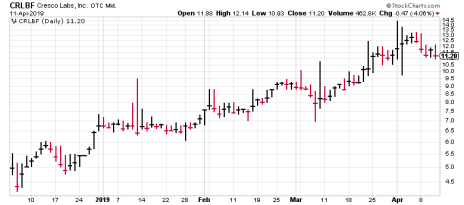Marijuana Stocks Have Immense Profit Potential in the Coming Years. But If You Don’t Know How to Invest in Marijuana Stocks, You Could Lose a Lot of Money.
Denny’s Story
I recently met a guy named Denny, who was a guest at my cousin’s house. Denny was wearing a Vietnam veteran’s hat, with three little Purple Heart patches sewn onto the edge—said he did two tours of duty. I told him I was too young; by the time I had a draft number, the war was winding down.
But what we really talked about—the reason we were introduced—was marijuana stocks. Denny said he’s been investing in marijuana stocks for a while, but what he’s really looking forward to is the advent of federal legalization, which he expects in 2022, because he thinks the stocks will really take off then.
Well, he may be right or wrong about the date; no one knows at this point. And when it comes to what the stocks will do, I think the best guide is what’s happened after previous experiences of legalization in both California and Canada. In short, the stocks start climbing as soon as the date is set, and peak when legalization actually takes effect.
Turning to individual stocks, Denny mentioned a marijuana stock that he recently bought that was selling for about three cents a share.
I forget the name.
[text_ad use_post='137724']
In fact, I didn’t even try to remember the name.
Denny’s not the only one. Every week I get queries from readers asking about marijuana stocks that are priced under a dollar. And every time, I analyze the chart, tell them what it says, and then suggest that the odds of making money are better in stocks priced above a dollar, like those in my Cabot Marijuana Investor.
What’s wrong with stocks trading under a dollar?
Above all, they’re more volatile stocks, as they tend to have very little (if any) institutional support, and thus are subject to the whims of individual investors. They’re typically thinly traded, which further adds to the volatility. And they’re typically development-stage companies that have a higher risk of failure than larger, more established companies.
“All true,” say the proponents. “But when you win, you win big. And I can buy a thousand shares of those stocks for peanuts.”
The trouble is, however, that when you lose, you lose big, and in penny stocks, you lose frequently.
As for owning a thousand shares, that’s irrelevant; it’s not the number of shares you own that counts, it’s the number of dollars you have invested. I’d rather own one share of a thousand-dollar stock in an uptrend (like AutoZone—AZO) than a thousand shares of a one-dollar stock (like Drone Delivery Canada—TAKOF).
Now, I will admit that when I started Cabot Marijuana Investor in August 2017, buying 10 marijuana stocks, eight of them were priced under $10. There simply weren’t many marijuana stocks trading over $10 then. But none of my recommendations were priced under a dollar.
Now, nearly two years later, the industry has made a lot of progress. My portfolio is up 162%. Only seven of the portfolio’s current 14 stocks are priced under $10. And while the average price of my under-ten-dollar holdings was 4.1 two years ago, today the average price of my under-ten-dollar holdings (not all the same stocks) is 7.5.
In short, the industry is growing up. But it still has a long way to go. And that’s illustrated by Tom’s story.
Tom’s Story
Tom is a social acquaintance here in Salem. He’s a lawyer for one of the big Boston banks. And we too recently talked about investing in marijuana stocks.
Tom is leery of the drug, and the likely reasons (I’m guessing here) are that he has two teenage children and—I assume—he’s never tried it.
His employer is leery too. According to Tom, marijuana businesses have inquired about using the bank’s services, but after much discussion about the legal ramifications, the bank’s answer was no. They don’t want the risk while the drug is still illegal on the federal level.
Now, they know that by passing up business connected to this fast-growing industry, they’re giving up some potential profits. But the bank’s not hungry. Its business is solid. And it prefers to avoid the risk entirely rather than get involved today.
Someday, of course, the bank will happily lend money to marijuana businesses, and its money managers will happily start investing in marijuana stocks. But by then, the industry will have matured further, risk will be lower—and opportunity will be lower too!
Investing in Marijuana Stocks: The Profitable (and Legal) Middle Ground
Somewhere between Denny’s penny stocks and the Boston bank’s total avoidance is the middle ground—and that’s where my readers are making money!
In my marijuana portfolio, the average company had revenues of $37.8 million in the most recent quarter, up an astonishing 385% from the previous year.
Some of these are Canadian companies; the Canadians are currently ahead fundamentally, having begun legal commerce in marijuana last October.
But a number of U.S. multi-state operators (MSOs) are catching up fast, growing both organically (no pun intended) and by acquisition—and eventually, the U.S. companies are expected to dominate.
And not all these companies are selling marijuana. One of my most profitable companies is a Real Estate Investment Trust (REIT) that invests exclusively in properties for the cannabis industry. Another is a dividend-paying smokeless tobacco company that is diversifying into the cannabis accessories business. Another is focused solely on CBD, the product of the cannabis plant that doesn’t get you high but might treat everything from Alzheimer’s to anorexia, epilepsy to emesis, insomnia to indigestion, osteoporosis to obesity.
Bottom line: There are a multitude of ways to profit in the cannabis industry, provided you follow a proven, rational investing system like we use at Cabot.
One Great Marijuana Stock
One of my main goals in Cabot Marijuana Investor is to get my readers invested early in the companies that have the best chance of leading this industry five and 10 years from now, so that eventually, they own the company that becomes the Marlboro of the marijuana industry.
Cresco Labs (CRLBF) is a definite contender.
Based in Chicago, Cresco Labs is one of the largest vertically integrated multistate operators (MSOs) in the cannabis industry in the United States. In the latest quarter, revenues were $17.0 million, up 411% from the year before.
On April 1, Cresco announced that it had reached an agreement to acquire Origin House, which has about 60% of the California retail market, delivering over 50 cannabis brands to more than 500 dispensaries in California.
The acquisition is the largest public company acquisition in the history of the U.S. cannabis industry, and the combined entity will be one of the largest MSOs in the country, with operations in 11 states.
Cresco was founded and is led by attorneys, who have proven adept at getting licenses in highly populated, highly regulated markets. But it also has deep branding/marketing expertise, thanks to executives who’ve honed their talents at Gatorade, MillerCoors, Nike, Pandora and Lifeway Foods, so the potential to develop and nurture market-leading brands is great.
As for the stock, CRLBF closed at new highs for four consecutive days when the Origin House deal was announced, and since then it’s consolidated that gain normally, trading in a range between 9 and 13, with trading volume steadily shrinking. Having just bounced off the bottom of that range, this could be a good entry point.
Now, if you want to know what other marijuana stocks I like right now, just click here to learn how to become a Cabot Marijuana Investor subscriber.
[author_ad]


